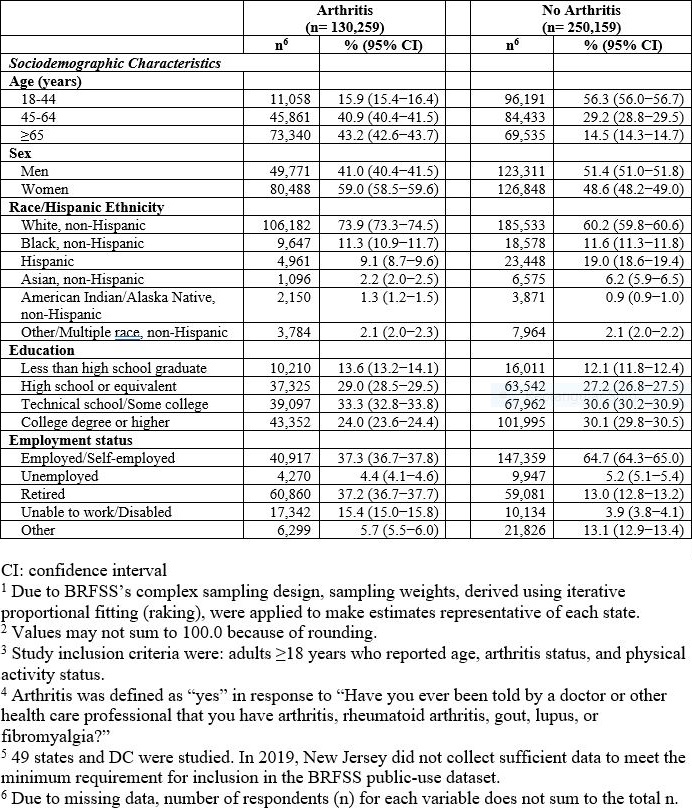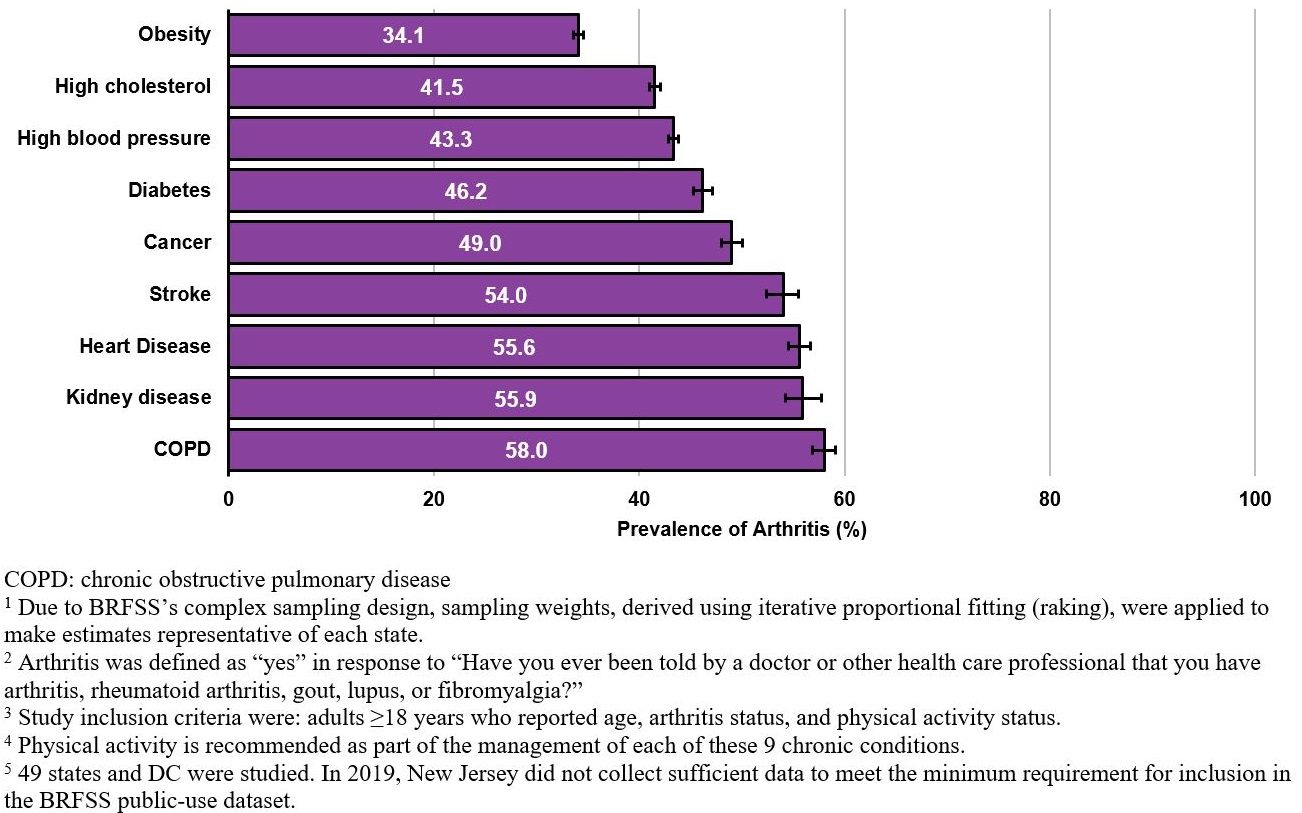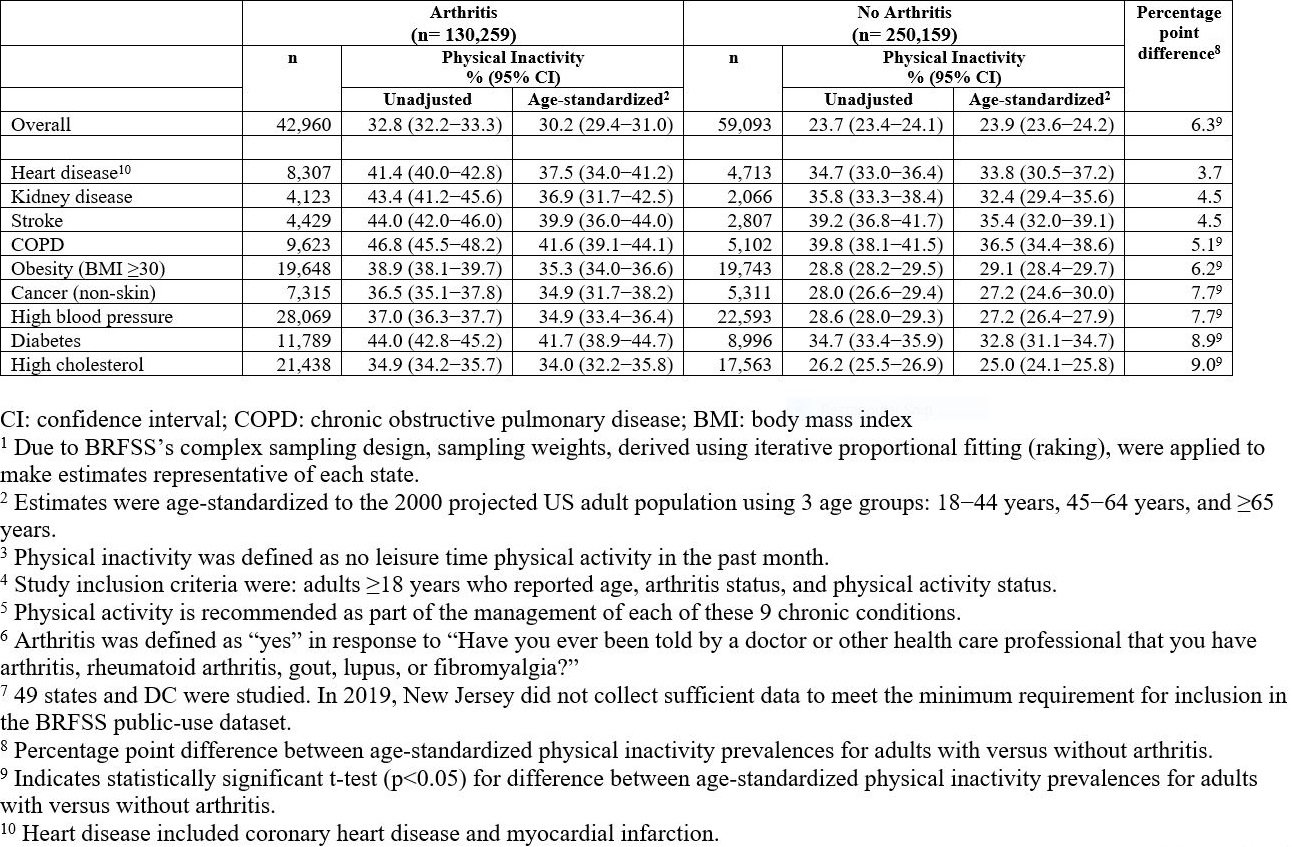Session Information
Date: Monday, November 8, 2021
Title: Epidemiology & Public Health Poster III: Other Rheumatic & Musculoskeletal Diseases (1022–1060)
Session Type: Poster Session C
Session Time: 8:30AM-10:30AM
Background/Purpose: Arthritis is associated with reduced physical activity (PA). PA can improve functional status, brain health, and weight management, reduce pain, prevent chronic disease, falls, and premature mortality, and prevent or delay disability. Arthritis is frequently comorbid with numerous chronic conditions for which PA is recommended for disease management, but information on physical activity among adults with arthritis across a range of comorbid chronic conditions is limited. We examined physical inactivity prevalence, stratified by arthritis status, among adults with 9 chronic conditions for which clinical guidelines recommend physical activity for disease management.
Methods: We analyzed 2019 Behavioral Risk Factor Surveillance System data from 49 states and District of Columbia for adults ≥18 years (n=380,418). Physical inactivity was no leisure-time PA in the past month. Arthritis was “yes” to “Have you ever been told by a doctor or other health care professional that you have arthritis, rheumatoid arthritis, gout, lupus, or fibromyalgia?” The 9 comorbid conditions were cancer (excluding skin), chronic obstructive pulmonary disease (COPD), diabetes, heart disease, high blood pressure, high cholesterol, kidney disease, obesity, and stroke. We estimated chronic condition-specific prevalence of 1) arthritis; and 2) physical inactivity (unadjusted and age-standardized), by arthritis status. We compared age-standardized estimates by arthritis status using t-tests (α=0.05).
Results: Distributions of sociodemographic characteristics by arthritis status differed most for age and employment status (Table 1). In 2019, the chronic condition-specific arthritis prevalence was highest for adults with COPD (58.0%), kidney disease (55.9%), and heart disease (55.6%) (range: 34.1%−58.0%) (Figure). Unadjusted physical inactivity prevalence among adults with a specific chronic condition and arthritis was highest for COPD (46.8%), stroke (44.0%), and diabetes (44.0%) (range: 33.0%−46.8%) (Table 2). Age-standardized physical inactivity prevalence was higher for adults with each chronic condition and arthritis versus those without arthritis (p< 0.05 for 6 conditions). Percentage point differences ranged from 3.7−9.0; largest differences were high cholesterol (9.0), diabetes (8.9), and high blood pressure and cancer (both 7.7).
Conclusion: Adults with arthritis had a notably higher physical inactivity prevalence for all comorbid chronic conditions; the pattern was significant for 6 of the 9. Observed differences may be attributed to arthritis-related barriers that need to be addressed. Health care providers can help their patients address arthritis-specific and generic PA barriers by recommending PA and chronic disease self-management education programs. Community organizations delivering these programs may be ideal partners for referrals, and expanded program delivery could reduce PA barriers and improve quality-of-life and health outcomes.
 Table 1. Distribution (weighted(1) percentages(2)) of sociodemographic characteristics for adults aged ≥18 years(3), by arthritis(4) status, 49 states and District of Columbia(5), Behavioral Risk Factor Surveillance System, 2019
Table 1. Distribution (weighted(1) percentages(2)) of sociodemographic characteristics for adults aged ≥18 years(3), by arthritis(4) status, 49 states and District of Columbia(5), Behavioral Risk Factor Surveillance System, 2019
 Figure. Weighted(1) prevalence and 95% confidence intervals of arthritis(2) among adults aged ≥18 years(3), across each of 9 chronic conditions(4), 49 states and District of Columbia(5), Behavioral Risk Factor Surveillance System, 2019
Figure. Weighted(1) prevalence and 95% confidence intervals of arthritis(2) among adults aged ≥18 years(3), across each of 9 chronic conditions(4), 49 states and District of Columbia(5), Behavioral Risk Factor Surveillance System, 2019
 Table 2. Weighted(1) unadjusted and age-standardized(2) prevalence of physical inactivity(3) among adults(4) aged ≥18 years, overall and for each of 9 chronic conditions(5), by arthritis(6) status, 49 states and District of Columbia(7), Behavioral Risk Factor Surveillance System, 2019
Table 2. Weighted(1) unadjusted and age-standardized(2) prevalence of physical inactivity(3) among adults(4) aged ≥18 years, overall and for each of 9 chronic conditions(5), by arthritis(6) status, 49 states and District of Columbia(7), Behavioral Risk Factor Surveillance System, 2019
To cite this abstract in AMA style:
Guglielmo D, Helmick C, Boring M, Theis K, Murphy L, Watson K, McGuire L, Duca L. Physical Inactivity Among Adults with Specific Chronic Conditions, by Arthritis Status, 49 States and District of Columbia, Behavioral Risk Factor Surveillance System, 2019 [abstract]. Arthritis Rheumatol. 2021; 73 (suppl 9). https://acrabstracts.org/abstract/physical-inactivity-among-adults-with-specific-chronic-conditions-by-arthritis-status-49-states-and-district-of-columbia-behavioral-risk-factor-surveillance-system-2019/. Accessed .« Back to ACR Convergence 2021
ACR Meeting Abstracts - https://acrabstracts.org/abstract/physical-inactivity-among-adults-with-specific-chronic-conditions-by-arthritis-status-49-states-and-district-of-columbia-behavioral-risk-factor-surveillance-system-2019/
